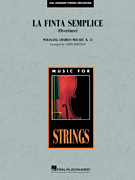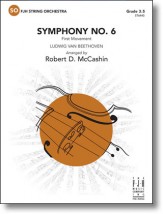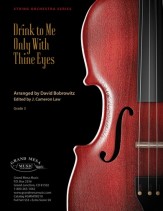Classical Transcriptions for Mid-to-Upper Level Strings Monday, January 07, 2019
recommended by Dan C., Orchestra Specialist
Here are Stanton’s Top Choice Classical Transcriptions for concerts and adjudications for this school year. Every string orchestra section gets interesting parts to play, each title contains all kinds of musical skills to teach and/or reinforce, and every one of them will bring pleasure to the players and the audience. None of these titles have been arranged for string orchestra before, yet it is standard classical repertoire. What a wonderful opportunity to introduce your students to new, top quality music. This is outstanding literature that needs to be experienced!
 La Finta Semplice Overture, K. 51 by W.A. Mozart/arr. Jamin Hoffman, Grade 3-4
La Finta Semplice Overture, K. 51 by W.A. Mozart/arr. Jamin Hoffman, Grade 3-4
If you want to introduce your high school players to the magic of Mozart, this would be an ideal tool for that purpose. Wolfy wrote it when he was 12 years old, and while it showed maturity beyond his years, he was still a novice, as your young students are, so it’s a match made in heaven. This is especially true if your first violins are your strongest section, since they get the bulk of the melodic content. Work on spiccato bowing, forte-pianos and the chromatic accidentals to catch the sparkle of the Mozart style.
 Symphony #6, First Movement by Ludwig van Beethoven/arr. Robert D. McCashin, Grade 3.5
Symphony #6, First Movement by Ludwig van Beethoven/arr. Robert D. McCashin, Grade 3.5
Every high school orchestra student needs to experience Beethoven. And what better piece than a movement from one of his famous symphonies? We don’t recall ever seeing an arrangement of the First Movement from Beethoven’s Symphony #6 (“Pastorale”) in recent history. And what a delight! In Beethoven’s words, it evokes “pleasant feelings which awaken…on arriving in the countryside.” The music is peaceful and tranquil, and at the same time spritely and effervescent. In 2/4 with the quarter note = 104-108, it bubbles along like a babbling brook. It is in the key of F, like the original, which shouldn’t tax students at this level. There are accidentals, triplets (and 3 against 2) double stops, staccato vs legato and other techniques typical of the Classical/early Romantic period. Robert McCashin has done an absolutely superb job with this transcription. Do yourself and your students a huge favor and get this masterpiece from the inimitable Ludwig van.
 Norwegian Dance Opus 35, No. 1 by Edvard Grieg/arr. Deborah Baker Monday, Grade 3
Norwegian Dance Opus 35, No. 1 by Edvard Grieg/arr. Deborah Baker Monday, Grade 3
Teach your students the importance of scales (“Why do we have to practice these things?”) because they will be needing fingerings for the natural, harmonic and melodic D Minor scales as well as the A Major scale for G# accidentals. Your second violins get to review the notes on their G string and the violas, their C string, and everyone gets work on chromatic accidentals. Every section gets some action so no one can complain about boring parts, plus the lively tune may bring to mind Grieg’s famous “In the Hall of the Mountain King.” Outstanding concert addition or adjudication option.
 Drink to Me Only with Thine Eyes arr. David Bobrowitz, Grade 3
Drink to Me Only with Thine Eyes arr. David Bobrowitz, Grade 3
The familiar melody was written in the late 1700s to words playwright Ben Johnson penned in 1616, so there is some history here! But it’s not the same old stuff you may expect. There are jazz harmonies with Neapolitan twists, unexpected rhythmic quirks and a contrasting pizzicato section that will get everyone’s attention. With a key change from C to D and everyone getting a crack at the melody, your students will enjoy playing it and your audience will get a thrill hearing it as well. Don’t miss this one!
About the Author:
Dan C. has worked at Stanton’s since 1979, primarily with orchestra music and print promotions. A “working” musician, he’s a classical cellist, a rock & jazz bassist and a folk & country guitarist/singer. His free time is spent with family or reading, gardening, cycling and working puzzles. His series of musical puzzles (RP3 Rebus Puzzle Picture People) can be found on the Stanton’s Facebook page each Sunday. He also has a reputation as a pretty good joke teller. Seriously.